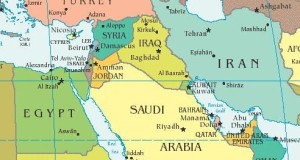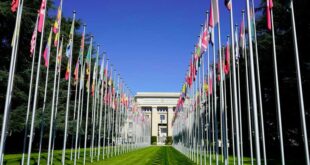In 1945, President Franklin Roosevelt reached a historic deal with the founder of the Kingdom of Saudi Arabia King Abdul Aziz ibn Saud. The deal shaped the US role in the Middle East as much as it shaped the region in many ways. Relations between the Arabs and the US became a cornerstone not only in regional policies, but also in global calculations. Seventy years later, President Barak Obama signed a deal with Iran. It may be still too early to say that the main US regional ally seems to have been replaced. The pages of regional events and the US role there are still to be written. But in as much as could be learned from the past, the coming story will depend on how it begins.
The point of start is already clear. Iran has a substantial military force. The balance of power and on-ground capabilities between the US and Iran, seen from regional angle, promise a totally different relations between Obama and the Mullahs than that which Roosevelt started with the Saudis.
Iran succeeded in preserving its nuclear capabilities. It will enjoy a free movement on a relatively homogenous world theater after lifting the sanctions. It will receive a windfall of money in a matter of weeks. Its proxies are promised a considerable increase in aid in addition to the psychological boost they got when the deal was signed. And the Ayatollahs’ regime did not ever look as stable as it does now.
It appears logical to build a bridge with that country. But the issue has never been the nuclear deal itself. It has always been what it entails. As in any relation between a super power and a regional partner, the question of where to place the borders between the two sides’ opposed national interests in the given region remains to be a challenge. The intrinsic contradiction in the whole picture of the new US-Iranian ties is precisely here. In every step of Tehran’s moves in the Middle East, the US will be questioned about the extent to which it approves the behavior of its new friends in Tehran. It is not a secret that Tehran harbors ambitions to revive its old regional empire as much as Erdogan was openly speaking about a new Ottoman Empire. A leading Mullah was recently speaking about Baghdad being the capital of a revived Persian Empire (We covered that at the time in MEB).
Iran’s regional ambitions will appear more clearly in the future, as a result of the boost it got from the deal, to impose some tough choices on any American administration. If Iran exceeds the norms of legal international behavior, as it already does, the US may be hesitant to take decisive actions for fear that Tehran may resume its frozen nuclear effort, or, seeing American reluctance to use military force, turns to be more aggressive. Even sanctions, similar to those imposed on Russia because of the Ukraine crisis, will be difficult. Such sanctions will be considered, by Tehran, and regardless of their reasons, a preach of the nuclear deal. A resumption of nuclear activities would be expected.
The consequences of the nuclear deal seem to be hanging on a thin thread. The US administration is adamant in confirming that its ties with the Arabs will not be affected by its new relations with Iran. But objectively speaking, where would anybody stand in a crisis like, say, Crimea? Russia or Ukraine? The truth is, when a regional crisis reaches a certain level of maturity, it would be impossible to find some space between the hammer and the anvil. Have we reached similar levels in the Middle East? Yes, we have. In Syria, Iranian and Lebanese Hezbollah forces are fighting openly in a country that is not theirs. In Iraq, and according even to official US statements, the Iranian Quds Brigades are present.
The nature of the polarization in the Middle East is really acute. And this is not only a problem for the region, it will be a problem for the US as well from now on. The space between the two warring sides does not allow the US any of the tools of the art of ambiguity. It is either here or there. It cannot keep its ties with the two sides without having to face bilateral periodic tension, if not more, with the other. Such tension in itself is a destabilizing factor in the Middle East.
Yet, there is quite a bit of spinning going on in town. Examples of the justification of the logic behind the deal is given by some Washington veteran experts. One of those experts warns us that we should not expect a change in Iran’s behavior overnight. Furthermore, he tells us that integrating Iran into the world and global economy will moderate its regional behavior by virtue of the given incentives. But haven’t we heard that before about Russia?
The expert warns us also that Iran will follow its national interests anyway, and that sometimes these interests will conflict sharply with US policies. Well, we heard the story of the idiot who put one foot on a boat and the other on another boat and assure every one that he is “very stable” while each boat is drifting away from the other. Now, let us assume that Iran interfered in Bahrain for example due to its own national interest calculations. This should not surprise anyone. Khamenei has just threatened the tiny island immediately after signing the nuclear deal. But thanks to this expert’s early warning, we are already prepared not to expect a change in Iran’s behavior overnight anyway. After all, as he says, it will take time to moderate Tehran’s behavior. But, even if we agree with this view, what could happen during this promised undetermined time? The boats will keep drifting away of each other.
Another benefit, stated by the expert, is that the “Iran funded militias in Iraq”, using his words, are the most effective force on the ground in fighting ISIL. Well, would they be more effective than the US forces which were sent to fight Al Qaeda in Iraq during President George Bush’s surge? It was said that Al Qaeda in Iraq was “defeated” and the mission was “accomplished”. But it wasn’t. Al Qaeda came back in the form of ISIL.
It all depends on how that expert, or others like him, define the word “defeat”. Defeating terrorism is either defined along the creative explanation of President Clinton to the word sex, or by going after the Hydra in its cave. We believe that when the US forces left Iraq, it left behind an unfinished job: building an inclusive political structure that addresses the plight of Sunnis and all other minorities in Iraq. So long as the Sunnis and others will remain excluded and treated like second class citizen, new violent groups will keep emerging among them after “defeating” the old ones.
Prime Minister Haider Abadi and other true Iraqi (in the inclusive sense of the word) Shia leaders like Muqtada Al Sadr and Ammar Al Hakim, understand this very well. But guess who is preventing that from happening? It is the “Iranian funded militias” that the expert talks about. He should have only followed the news of Iraq closely before writting about what to expect from the “the Iran funded militias”.
Obviously, the expert has already found some undiscovered beauty in the Iran nuclear deal. But Iran’s role in Iraq will not lead to defeating ISIL, it will lead to its long term regeneration. What will lead to a real defeat of ISIL there is a political solution that grants all Iraqis, regardless of sect, religion, nationality, and all else, equal rights. The only ray of hope, faint as it is, is the few brave Marines training Arab tribal volunteers in Taqaddum base to establish a base for what hopefully will be an ISIL immune central Iraq.
Once ISIL is “defeated”, the way the expert defines this defeat, it is certain that the “Iranian funded militias” will turn against any Sunni tribal force and will not leave the major Sunni urban centers it “liberated” on behalf of Tehran. Wouldn’t that regenerate ISIL? Is this the expert’s definition of “defeat” of ISIL on the hands of the “Iran funded militias”? Victory sometimes comes void of any real victory. The problem in Iraq is political first, military second, not the opposite.
In a way, the Obama administration sincerely believes that the nuclear deal is a victory. It stopped Iran from obtaining the bomb, it helped avoid a war and it opened new frontier to the US foreign policy. But these arguments reveal, in and by themselves, a misconception of how the Middle East work.
The truth of the matter is that President Obama accepted to trade a more dangerous Iran (a nuclear Iran) with a less dangerous, yet still very dangerous, Iran (a quasi-nuclear Iran). Now, Americans have to consider the less dangerous Iran an ally. They have to find a place for their regional policy somewhere in the Obama magic space between the hammer and the anvil.
But if the President admits that Iran is still dangerous, as he indeed does, he better be prepared to explain the reasons why his administration turned its face to the other side when it saw the Iranian Quds Brigades-a US designated terrorist group-fighting in Iraq and Syria. He also better be prepared for what will the US do when the space for verbal spinning and strategic ambiguity is reduced to almost zero. Eloquent speeches do not help much in times of war.
It is said that the US measured its actions in the Middle East to avoid upsetting the Iranians during the negotiations. The professional spinners will deny that of course, though there are many circumstantial evidence showing that the administration did indeed caliber some of its decisions to avoid annoying the Mullahs.
Here is the deal that President Obama got: The President lost the Arab trust to gain a dangerous Iran. And by the way, Iran will be difficult to adapt to international norms. In Tehran, we have a mix of nationalist supremacy, rigid religious beliefs, and old images of a great empire that the time of its resurrection is upon us.
Is it a good deal? The President is convinced it is.
The President, in fact, won a battle in the Middle East but lost the war there. The problem is that he celebrates his victory in this battle without seeing that he has just lost the war. The nuclear deal shook the foundation laid by President Roosevelt. It will put the US in a camp with a country that has uncompromising ambitions which contradicts every single part of the US interests in that region. If the President believes he can hide in the gray area of ambiguity by emphasizing the “solid” ties with the Arabs and the “unshakable” commitments to their security, it may be helpful to remind him that no one in the Middle East buys this stuff anymore.
 Geostrategic Media Political Commentary, Analysis, Security, Defense
Geostrategic Media Political Commentary, Analysis, Security, Defense





